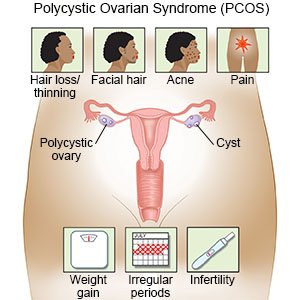Polycystic Ovarian Syndrome
Medically reviewed by Drugs.com. Last updated on Apr 6, 2025.
What is polycystic ovarian syndrome (PCOS)?
PCOS is a group of symptoms caused by a hormone disorder. Your body produces too many hormones and your ovaries do not work correctly. Your ovaries have fluid-filled sacs with an immature egg in each one. These are called follicles. The follicles grow bigger and make your ovaries look like they have cysts in them. PCOS increases your risk for endometrial cancer and infertility.
 |
What causes PCOS?
The exact cause of PCOS is not known. Androgens (male hormones), such as testosterone, are normally made by the ovaries. When the ovaries produce too much of these hormones, ovulation stops. High levels of insulin in your blood may also contribute to PCOS. Insulin resistance causes the high levels of insulin in your blood. Insulin resistance happens when your body does not use insulin properly. Your risk may be increased if you have a family member with PCOS or other ovarian disease.
What are the signs and symptoms of PCOS?
- Irregular or absent monthly periods
- Extreme hair growth on your face, chest, and back
- Acne, thinning hair or baldness on your scalp
- Weight gain, especially around your abdomen
- High blood sugar levels or high blood pressure
- Periods of extreme sadness and extreme happiness
- Difficulty getting pregnant
- Darkening of the skin around your neck creases, groin, and under your breasts
- Skin tags in your armpits, or on your neck
How is PCOS diagnosed?
Your healthcare provider will ask about your symptoms and when they began. He or she will ask if you have any family members with PCOS. He or she may ask about your menstrual history, pregnancies, and medicines. You may also need any of the following tests:
- Blood tests measure your hormone levels.
- A transvaginal ultrasound uses sound waves to show pictures of the inside of your vagina. The ultrasound wand is placed about 2 or 3 inches inside your vagina. Your healthcare provider will be able to see problems with your ovaries, uterus, fallopian tubes, cervix, or vagina.
How is PCOS treated?
- Medicines may be given to control your blood sugar. You may need medicines to decrease male hormones, and increase female hormones. These medicines may also improve acne, baldness, and hair growth you do not want. You may also need medicine to help you ovulate if you want to get pregnant.
- Surgery to remove your ovaries is rarely done. Surgery will not cure PCOS, but it may help some of your symptoms. Talk with your healthcare provider about what is right for you.
How can I manage my symptoms?
- Manage other health conditions. PCOS increases your risk for diabetes, heart disease, and high blood pressure. Your healthcare provider may send you to specialists that teach you how to manage these conditions.
- Maintain a healthy weight. Ask your healthcare provider how much you should weigh. Ask him or her to help you create a weight loss plan if you are overweight. Weight loss can help reduce the symptoms of PCOS. You and your healthcare provider can set manageable weight loss goals.
- Exercise as directed. Exercise can help keep your blood sugar level steady, lower your risk for heart disease, and help you lose weight. Exercise for at least 150 minutes every week. Spread this amount of exercise over at least 3 days in the week. Do not skip exercise more than 2 days in a row. Include muscle strengthening activities 2 to 3 days each week. Examples of exercise include walking or swimming. Do not sit for longer than 30 minutes at a time. Work with your healthcare provider to create an exercise plan that is right for you.


- Eat a variety of healthy foods. Healthy foods include fruits, vegetables, whole-grain breads, low-fat dairy products, beans, lean meats, and fish. A dietitian may help you plan meals to help manage your other health conditions.

When should I call my doctor or gynecologist?
- Your symptoms get worse.
- You have questions or concerns about your condition or care.
Care Agreement
You have the right to help plan your care. Learn about your health condition and how it may be treated. Discuss treatment options with your healthcare providers to decide what care you want to receive. You always have the right to refuse treatment. The above information is an educational aid only. It is not intended as medical advice for individual conditions or treatments. Talk to your doctor, nurse or pharmacist before following any medical regimen to see if it is safe and effective for you.© Copyright Merative 2025 Information is for End User's use only and may not be sold, redistributed or otherwise used for commercial purposes.
Further information
Always consult your healthcare provider to ensure the information displayed on this page applies to your personal circumstances.
